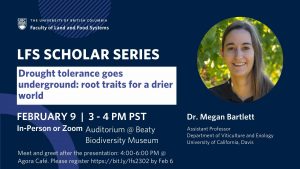This week’s IRES Seminar is in the Beaty Museum Theatre. Reminder: No food or drinks allowed in the Museum.
January 19, 2023: IRES Student Seminar with Vincent Chireh and James Wu
Time: 12:30pm to 1:20pm
Location: Beaty Museum Theatre (2212 Main Mall)
Click here to register in advance to receive a Zoom link.
Zoom Rule: If we encounter technical difficulties during the first 5 to 10 mins of the seminar, Zoom will be terminated.
Water Demand Management and Conservation Practices in British Columbia, Canada
Talk summary:
As climate change amplifies water challenges, especially in urban areas, policymakers are adopting innovative measures and practices to keep pace with water demand. Coupled with rising water demand, competing use for water, high infrastructure cost, and pollution, local jurisdictions in BC are progressively integrating demand management into water management. It is important to explore what measures are being implemented, the motivation for adoption, the impact on water pricing/billing, and affordability. Survey data from 97 local jurisdictions show that water-use restrictions, volumetric pricing, and conservation campaigns are the measures cities and municipalities commonly implement. Even though metering presents a clear chance to monitor, measure, and regulate residential water use, many jurisdictions face financial and personnel challenges in implementing it. Public engagement, financial stability, and effective planning can assist in ramping up WDM to reduce wasteful water consumption and save the environment.
Vincent Chireh, PhD Candidate at IRES
Bio:
Vincent is a PhD Candidate at IRES in UBC, working under the supervision of Leila Harris and Jordi Honey-Rosés. His research broadly focuses on water governance, global climate change, environmental sustainability, and political ecology. His PhD project explores the social equity implication in water governance policies in BC in the context of regulating demand and conserving water in response to climate change. He has also collaborated with BC municipalities to explore strategies to implement climate policies to achieve equitable outcomes. His research agenda builds on this foundation to explore social equity in environmental management, including resource management, climate mitigation and adaptation.
How does framing influence preference for multiple solutions to societal problems?
Talk summary:
Solutions to environmental and social problems are often framed in dichotomous ways, which can be counterproductive. Instead, multiple solutions are needed to solve the problem. Here we examine how framing influences people’s preference for multiple solutions to environmental and social problems. In a pre-registered experiment, participants (N=1,432) were randomly assigned to one of four framing conditions (multi-cause frame, multi-impact frame, multi-solution frame, and control). In the first three conditions, participants were presented with a series of problems (e.g., climate change, plastic pollution, homelessness, police reform), each framed with multiple causes, multiple impacts, or multiple solutions to the problem. The control condition did not present any framing information. Participants indicated their preferred solution, perceived severity and urgency of the problem, and their dichotomous thinking tendency. Pre-registered analysis showed that none of the three frames had a significant impact on the preference for multiple solutions, perceived severity, perceived urgency, or dichotomous thinking. However, exploratory analyses showed that perceived severity and urgency of the problem were positively correlated with people’s preference for multiple solutions, but dichotomous thinking was negatively correlated with multi-solution preference. These findings show a limited impact of framing on multi-solution preference. Future interventions should instead focus on increasing perceived severity and urgency, or decreasing dichotomous thinking to encourage people to adopt multiple solutions to address complex environmental and social problems.
James Wu, MSc student at IRES
Bio:
James Wu is a Master of Science student at IRES under the supervision of Dr. Jiaying Zhao and Dr. Claire Kremen. His current research focuses on behavioural interventions aimed at reducing dichotomous thinking and promoting a multi-solution approach to important societal issues (e.g., climate change, plastic pollution). James is also an ecologist by training, and has been involved in projects that examine the interplay between biodiversity, agricultural intensification and crop productivity, as well as how climate change generates trophic cascades.
See you on Jan 19 in the Beaty Museum Theatre!
_______________________________________________________________________________
Bonnie Leung
RES Program Support (she/her/hers)
Institute for Resources, Environment and Sustainability (IRES)
University of British Columbia | Vancouver Campus | Musqueam Traditional Territory
Aquatic Ecosystems Research Laboratory (AERL Building)
Room 429 – 2202 Main Mall | Vancouver, BC | V6T 1Z4 | Canada
Email: bonnie.leung@ubc.ca
Tel: 604-822-9249
